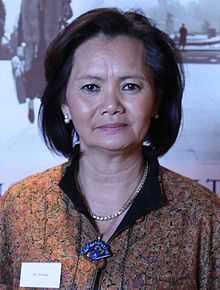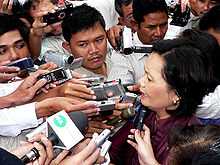Mu Sochua
| Mu Sochua មូរ សុខហួ MP | |
|---|---|
 | |
| Mu Sochua in 2009. | |
| Member of Parliament for Battambang | |
| Incumbent | |
| Assumed office 5 August 2014 | |
| In office 30 November 1998 – 27 July 2003 | |
| Member of Parliament for Kampot | |
| In office 24 September 2008 – 24 September 2013 | |
| Minister of Women Affairs | |
| In office 1998–2004 | |
| Prime Minister | Hun Sen |
| Personal details | |
| Born | 15 May 1954 Phnom Penh, Cambodia |
| Political party | Cambodia National Rescue Party |
| Other political affiliations |
Sam Rainsy Party (2004–2012) Funcinpec Party (1989–2004) |
| Spouse(s) | Scott Leiper (m. 1984) |
| Children | Thida Leiper Devi Leiper Malika Leiper |
| Alma mater | San Francisco State University (B.A.P.S.Y.) University of California, Berkeley (M.S.W.) |
| Religion | Buddhism |
Mu Sochua (Khmer: មូរ សុខហួ; born May 15, 1954) is a Cambodian politician and rights activist, and Member of Parliament (MP) for Battambang. In 2005, she received the Leadership Award in Washington, DC, from the Vital Voices Foundation, co-founded by Senator Hillary Rodham Clinton. In 2002 she mobilized 12,000 women candidates to run for commune elections, with over 900 women winning and still actively promoting the women's agenda at the grass-roots level. In that same year she helped create and pass the Prevention of Domestic Violence Bill, which imposes severe penalties on marital rape and abuse of minors. Her work in Cambodia also includes campaigns with men to end domestic violence and the spread of HIV/AIDS; working for the rights of female entrepreneurs; working for labor laws that provide fair wages and safe working conditions for female workers; and working for the development of communities for squatters with schools, health centers, sanitation, and employment.
Early life
Sochua was born in Phnom Penh to a Khmer Krom father and a Sino Khmer mother and received her early education at the French Lycee. In 1972, Sochua's parents sent her to Paris for further studies.[1] A year later, she relocated to San Francisco to join her brother over there. When the Khmer Rouge took control of Cambodia in 1975, her parents vanished. Sochua would remain in exile for the next 18 years. While Sochua was in the US, she earned a bachelor's degree in Psychology from San Francisco State University and a masters degree in Social Work from the University of California, Berkeley before returning to Cambodia to help rebuild a society shattered by war.
Return from exile

Sochua returned to Cambodia in 1989 after 18 years in exile, and has worked as an advocate for human rights, working to stop human trafficking, domestic violence and worker exploitation. Sochua formed the first organization for women, called Khemara (Khmer: ខេមរា). and joined the Funcinpec political party, winning a national assembly seat representing Battambang in 1998. Soon afterwards, she was asked to take over the Ministry of Women's and Veterans' Affairs, one of only two women in the cabinet.
In July 2004 she stepped down from her role as a Minister, citing corruption as a major obstacle to her work. Almost immediately, she transferred her allegiance to the Sam Rainsy party, where she is deputy head of the steering committee.
April 2009 defamation action

At a press conference held on 23 April 2009, Mu Sochua announced she would file a defamation complaint against Cambodian prime Minister Hun Sen with the Phnom Penh Municipal Court. “I have nothing against Samdech the Prime Minister. As a Member of Parliament, I respect him. But the words of Samdech the Prime Minister said in public affect my honour and my dignity as a Khmer woman. With this complaint, I only want justice and honour, as a Khmer woman”, Sochua said. She added that she only claimed a 500-riel (0.12 dollar) compensation as a token, and a public apology on the part of the head of government.[2][3]
Following Sochua's announcement, the government was expected to file a counter-suit for gravely defaming the PM. The Ministry of Justice was expected to request the President of the parliament to vote to remove Sochua's parliamentary immunity. With only 25 percent of the votes, the SRP would be powerless to prevent further action against her – including imprisonment. Sochua's letter calling for support from the international community – "As I walk to prison" — was circulated around the World Wide Web.[4]
On two previous occasions, when SRP party leader Sam Rainsy's parliamentary immunity was removed, he fled Cambodia under threat of criminal charges and went into exile in France.[5]
Personal life
Sochua is married to Scott Leiper, an American whom she married in 1984, and is a mother of 3 daughters. She has lived in the United States for 18 years and attended university there. She also reportedly lost her ability to speak formal Khmer, having left her home country fore more than a decade.[6]
Awards and recognition
In 2005, Sochua was one of 1,000 women nominated for the Nobel Peace Prize for her work against sex trafficking of women in Cambodia and Thailand. Also in 2005, Sochua was honoured with the Vital Voices Human Rights Global Leadership Award for her efforts to stem the tide of human trafficking.
In 2006, Sochua was awarded the Elise and Walter A. Haas International Award from the University of California, Berkeley for distinguished record of service in Cambodia and an Honorary PhD in Law from the University of Guelph, Canada.
In 2009, Sochua was awarded the Eleanor Roosevelt Award from the Eleanor Roosevelt Project at The George Washington University for leadership in human rights.
In 2010, Sochua was named the 2010 People's Choice Honoree by Global Exchange for their Human Rights Heroes Award. The Human Rights Awards Gala brings together activists, supporters, and friends to recognize the efforts of exceptional individuals and organizations from around the country and around the world.[7]
References
- ↑ Doyle, Kelvin, Mu Sochua: Protesting with poise, The Advisor Cambodia, 7 August 2014
- ↑ "ABC Radio Australia: Connect Asia's report on the defamation action". Retrieved April 26, 2009.
- ↑ "Phnom Penh Post's report on the defamation action". Retrieved April 26, 2009.
- ↑ "Mu Sochua's "As I walk to prison", published on the Vital Voices website". Retrieved April 26, 2009.
- ↑ "From chaos to order in Cambodia, published in the Asia Times Online". Retrieved April 26, 2009.
- ↑ "Uphill fight for women's rights". The Phnom Penh Post. 21 May 2004. Retrieved 9 August 2014.
- ↑ http://humanrightsaward.org/
External links
| Wikimedia Commons has media related to Mu Sochua. |
- Mu Sochua Official site
- Mu Sochua's Blog Official blog
- Bringing corruption to heel, Published in the South Eastern Globe, November 2008.
- Vibrant Cambodian Women's Leader Aims to Turn the Tide on Corruption, Published in the The New York City Independent Media Center, April 2009.
- Females making their presence felt, Published in the South Eastern Globe, December 2008.
- Cambodia's New War, Published in The Daily Beast, April 2009.
- A Face of Cambodian Courage, Published in The Indypendent, April 2009